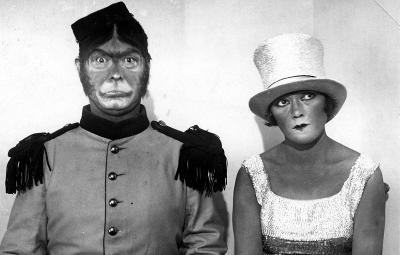
Yes, it’s true: I really ordered a used copy of a Hungarian play, Ferenc Herczeg’s Majomszínház (1925, although what I ordered was volume 11 of his selected works, also containing Árva László Király, published in 1934) from a used bookstore in Szeged, Hungary. (Köszönöm a segítséget to all at Antikvarium.hu!) And I did so just because—as I explained in part 1—The New York Times for January 2, 1927, claimed that Herczeg “is probably the first playwright to utilize the celebrated Dayton trial as the theme for a play.” Under the title Monkey Business, a translation of the play was supposed to start rehearsal in New York shortly after the Times article appeared. But as far as I can tell, the play was never produced, and the translation was never published. I was left with no recourse but to obtain a copy of Majomszínház and to see for myself if it was based on the Scopes case.
As it happens, I don’t understand Hungarian, and I have learned from Monty Python to be wary of Hungarian phrasebooks (“My hovercraft is full of eels”). Undaunted, when the book arrived, I scanned each page of the play into a PDF, processed the PDFs through an optical character recognition program set to recognize Hungarian, proofread the results, and entered the proofread results page by page into Google Translate. The outcome was inelegant, occasionally mysterious, but overall comprehensible. I wouldn’t recommend the process if you were trying to translate a novel or a poem from the Hungarian, but since Majomszínház is a light comedy, it consists mainly of dialogue in short, relatively simple, sentences, plus straightforward stage directions: none of which seemed unduly to tax the resources of Google Translate.
Majomszínház translates as Monkey Theater or Ape Theater—the Hungarian “majom,” like the German “Affe” or the French “singe,” apparently applies indifferently to monkeys and apes. For simplicity, I’ll just use “monkey” consistently. The play takes place in the tropics, where a clan of monkeys inhabits a jungle of increasing economic importance to the nearby human community. The monkeys are capable of speech—and in fact make speeches during their board meetings in the jungle, presided over by their bespectacled leader Vauvo—but conceal the fact from humans, because they are concerned about the tax implications. (Similarly, in Java and Mozambique, folklore reportedly claims that apes are capable of speech but refrain, for fear that they will be put to work.) But the secret is now out, thanks to a young female monkey, Rákitáki-Juláhé (seen above, right).
Rákitáki longs to be a human, coiffing and dressing herself accordingly, and even playing tennis with the local humans. It was during a tennis game, in fact, that she first betrayed the secret of the monkeys, by calling out the score. She was passing for a human successfully—she proudly says that a professor of zoology doffed his hat to her—until two stray dogs started to chase her. Rescued from the dogs by a human, Tomy, she fell in love with her rescuer. Thinking her love to be reciprocated, Rákitáki predicts that Tomy will ask for her hand in marriage—although she wonders which of the four it will be. Vauvo is appalled: “Are you crazy? Do you want to go for a cyclist? After all, you could get any orangutan [orgutángot]!” But the majority of the monkeys is not opposed, thinking that the law requiring monkeys not to speak around humans is outdated.
Rákitáki is further able to recruit support among her fellow monkeys because she explains that Tomy is interested in the economic development of the jungle. The monkeys are divided about the prospect. Many look forward to serving on the board of a limited liability company, but Captain Franklin (seen above, left), a new monkey in the jungle, is opposed. (His rank is due to the fact that he believes that he used to serve in a human army, although when he describes his soldiering to the monkeys, it becomes clear that he was performing with an organ grinder.) Tomy visits the jungle to ask Rákitáki’s father Sir Tobiás for her hand—they agree on a front hand—but he seems more interested in the details of the real estate transaction to follow. But Tobiás grants his consent nevertheless, and the monkeys are invited to a soirée in honor of the engagement. That ends act I.
As Act II begins, the humans are preparing for the soirée. It gradually becomes clear that Tomy’s family, especially his snobbish mother, is unaware that his fiancée is a monkey. The mother is given a series of lines bragging about the family’s distinguished lineage, punctuated—and punctured—by various family members correcting her, for instance when Tomy remarks that his grandfather was never persuaded to marry his lovely grandmother. When the conversation turns to Tomy’s fiancée’s lineage, Tomy dismisses his mother’s worry that she’s from a new family: “On the contrary, it is an ancient family! The Lord God made them a day earlier than us.” As the penny begins to drop, Tomy protests the “often very superficial and arbitrary classification” of zoology. His mother exclaims in horror, “Jesus! Not an actress?”
Once it’s clear that Tomy’s fiancée is a monkey, the family reacts with consternation (except for his sister Glória, who finds the proposed mésalliance thrilling). But they are reconciled to it when Tomy explains his plan: the natural resources in the jungle are “tantamount to a European kingdom,” he says, and his family will be the main shareholders of the company formed to exploit them. Tomy has already picked a name, Ideal, for the two-thousand-ton steam yacht he plans to buy. As the monkeys arrive, through the upper window rather than through the door, for the soirée—Rákitáki in a gown, Tobiás in evening dress, Franklin in his soldier’s uniform, and so on—the family is looking for ink with which the monkeys will sign the legal papers. Will the monkeys be defrauded of their jungle by the humans? You’ll find out in part 3.

